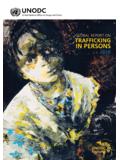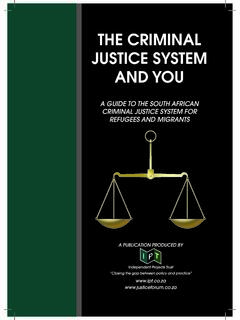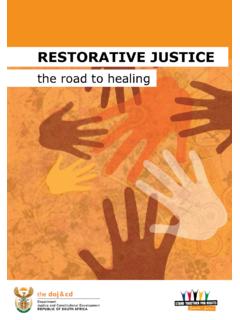Transcription of Theme E: Religion, Crime and Punishment
1 GCSE Religious Studies Theme E: religion , Crime and Punishment Revision Booklet Paper 2: Thematic Studies 4 mark CONTRAST Questions The religious tradition of GB: Christianity Question 3. The 4 mark questions in Theme A can be either: Explain 2 contrasting beliefs about . Explain 2 similar beliefs about . Explain 2 contrasting views in contemporary British Society about You MUST discuss the main religious tradition of GB: CHRISTIANITY. Contrasting views in Contemporary British society can only be on . Corporal Punishment Death Penalty Forgiveness 2. Glossary 3. Glossary 4. Christianity and the Law Christians believe that law breakers should be forgiven and given a second chance but they need to be punished as well during which time they are helped to reform.
2 A man reaps what he sows' (Galatians). Christians believe they should work with people to discourage reoffending and although poverty cannot be used as an excuse for breaking the law trying to reduce poverty and bad social conditions may prevent law breaking. Christians believe that law breakers should be encouraged and helped to repent (say sorry) leading to forgiveness. 5. Christianity and the Law Most Christians also believe that offenders should be helped to change their ways so that they do not reoffend once the Punishment is over. In the parable of the sheep and goats, Jesus gave various actions that are pleasing to God, and these include treating prisoners well.
3 Come, you who are blessed by my Father; take your inheritance, the kingdom prepared for you since the creation of the world. For .. I was in prison and you came to visit me.. Some Christians believe a Punishment should be as severe as the Crime committed. Others believe they should be helped in order that they do not offend again. They may hate the Crime but not the person who committed it. Christians believe that inhumane treatment of offenders is wrong. 6. Types of Crime There are three key types of crimes: Crimes against the person . offences causing direct harm to a person, for example, murder, rape, GBH and hate crimes.
4 Crimes against property . offences that damage or deprive people of their property, for example, arson, burglary, trespassing. Crimes against the State . offences that potentially Hacking endanger everyone or affect the smooth running of society, for example, terrorism, selling state secrets, perjury. 7. Causes of Crime Upbringing This might include the environment a person is brought up in, the morals of the family/friends/neighbourhood, whether a person is surrounded by crimes or criminal activity and the social and financial status of the family. 8. Causes of Crime Mental illness The state of mind of a person may lead them into Crime .
5 They might have serious psychological issues with no understanding of right or wrong; might feel no guilt or compassion for others;. might enjoy hurting others; might have educational learning issues and be easily led into Crime ; or are themselves victims of some event which has disturbed their minds, for example, depression or an abusive upbringing. Addiction A person may have an addiction, for example, to alcohol, drugs, sex or money which leads them into Crime to feed their habit or their cravings. They may even be addicted to Crime , for example, stealing. Poverty A person might commit a Crime because they see no other alternative way to survive.
6 They may have no money, no job or cannot provide for themselves or their children. 9. Causes of Crime Greed/hate Emotions are often responsible for Crime , our reaction to what goes on around us or what others have or do to us. We always want more so inherently we are greedy. People do bad things to us so hate leads us to take revenge and commit crimes. Opposition to existing laws Some crimes are committed in protest about laws that exist that are considered either unfair or for the benefit of a select few in society. Sometimes laws have to be broken to get laws to be changed. Religious people often feel a duty to oppose unjust laws.
7 10. Aims of Punishment There are 4 main aims of Punishment : Deterrence Reformation Retribution Protection Society sets up rules and we have to obey them or face the consequences. However, what one person thinks is very wrong, another person might consider less so. That is why we have a judicial system that sets tariffs for punishments to guide judges in the sentences they hand down. A judge will also know other information before they give a sentence. For example, if the person has offended before, information from psychologists and perhaps about their home background. There are four main aims of Punishment .
8 11. Deterrence A Punishment is meant to be unpleasant and a deterrence, so that the offender is put off committing crimes in the future. A burglar who gets sent to prison for five years will hopefully not want to experience that again and will find some other legal means to obtain money and possessions. Also, we learn very quickly that when we do wrong we may be punished, so if they know what the Punishment is going to be, many people would be put off committing the Crime in the first place. For example, the penalty for drink driving in the UK. is a minimum 12-month driving ban, a fine and potentially a prison sentence which deters people from drink-driving.
9 12. Protection The whole point of having a legal system is to protect society. Some criminals are dangerous and society needs protection and the criminal needs protection from society also. When a person shows no remorse for what they have done and continues to be a threat they have to be locked up for the safety of others. We lock mass murderers away to prevent them from killing any more people. Types of Punishment that offer protection: Prison Capital Punishment Curfews/Electronic tags 13. Retribution This is taking revenge on the offender; simply put it means getting your own back'. When people break the law someone somewhere is almost always hurt, even if it means they are just upset or angry.
10 Most people follow the law so it is not fair that a few people want to just ignore the rules and do as they please. Society uses Punishment to make the offender pay for what they have done and show support for the victim. They do this by demonstrating that the criminal has not got away with hurting them. In some cases retribution can be very severe. In the UK, criminals can receive lengthy prison sentences; other countries use capital or corporal Punishment . 14. Reformation Obviously society cannot simply lock up everyone who breaks the law and throw away the key. Many punishments are given to try to change the nature of the person who has offended.




